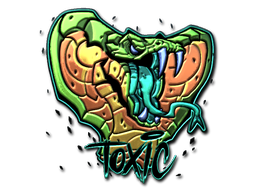Daily Pulse: Global Insights
Your daily source for news and insightful information from around the globe.
CSGO Toxicity Reports: Exposing the Silent Killers of Competitive Play
Uncover the hidden dangers of CSGO toxicity that threaten your game. Join us as we expose the silent killers in competitive play!
Understanding CSGO Toxicity: What You Need to Know
Understanding CSGO Toxicity is crucial for any player looking to enhance their gaming experience and foster a better community. Toxicity in Counter-Strike: Global Offensive (CSGO) often manifests as negative behavior, including harassment, offensive language, and griefing. This type of behavior not only affects individual players but can also lead to a decline in overall team performance. Understanding the root causes of this toxicity may help players recognize their own behaviors and promote a healthier gaming environment.
To combat CSGO toxicity, developers have implemented various measures, such as reporting systems and penalties for toxic behavior. Players can contribute by adhering to the following guidelines:
- Always maintain a positive attitude, even in challenging situations.
- Use in-game communication constructively.
- Report any observed toxic behavior to help maintain a respectful gaming atmosphere.

Counter-Strike is a popular tactical first-person shooter game series that focuses on team-based gameplay. Players can engage in intense battles as either terrorists or counter-terrorists, completing objectives or eliminating the opposing team. For those looking to enhance their gaming experience, there are Kostenlose CS2-Hüllen available to collect and trade.
How Toxic Behavior Impacts Competitive Play in CSGO
Toxic behavior in competitive play can have a detrimental impact on the overall gaming experience in CSGO. When players engage in negative actions, such as verbal abuse or intentionally sabotaging teammates, it creates an unhealthy environment that affects team dynamics. This can lead to decreased morale and, subsequently, lower performance levels. According to numerous studies, games rooted in cooperation, like CSGO, thrive on synergy and team psychology; when players feel disheartened by toxicity, their ability to work together diminishes.
Moreover, the repercussions of toxic behavior in competitive gameplay extend beyond immediate matches. Players who frequently encounter or exhibit toxicity may develop a negative perception of the game, leading to decreased engagement and a higher likelihood of abandoning the community altogether. This creates a ripple effect where fewer players participate, which ultimately impacts matchmaking times and game quality. To foster a vibrant competitive scene, it's essential that players recognize the importance of maintaining a respectful and supportive environment, ensuring both personal enjoyment and the longevity of the game itself.
What Are the Signs of Toxicity in CSGO Matches?
In the ever-competitive world of CSGO, recognizing the signs of toxicity during matches is crucial for maintaining a healthy gaming environment. One of the most evident indicators is the presence of negative remarks in the chat. Frequent insults or derogatory comments directed at teammates can create a hostile atmosphere, discouraging collaboration and leading to gameplay failures. Additionally, players who frequently engage in blame games or refuse to coordinate with the team strategy may exhibit toxic behavior, undermining the overall experience for everyone involved.
Another significant sign of toxicity in CSGO matches is the phenomenon known as rage quitting. This occurs when players abandon a match in frustration due to perceived poor performance or dissatisfaction with the team's efforts. Such actions not only affect the team’s chances of winning but also contribute to the demoralization of remaining players. Furthermore, consistent negative attitudes, such as players who continually express despair or hopelessness, can signal toxicity and affect the mental state of the entire team. Recognizing these behaviors early can help players take steps to mitigate their impact on gameplay.